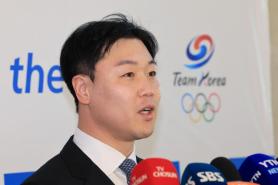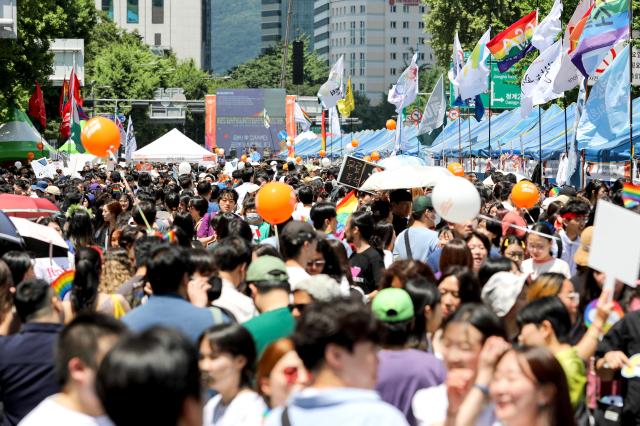
This is the second time the festival was held near Euljiro 1-ga Station, about 500 meters (0.3 miles) from Seoul Plaza where it was originally held. People of all ages and genders entered the festival area set up on the street and guarded by fences and police lines and enjoyed the festivities with big smiles. Many wore special costumes, including rainbow flags or bracelets made of intertwined strings representing the rainbow colors, the symbol of the LGBTQ+ community.
"There's no queer festival of this size where I live, but this one is the biggest in the country with the most participants' booths. That's why I came here," said Jang Dong-jun, a 29-year-old visitor from the southern city of Suncheon. However, he expressed disappointment that the festival was not held in the iconic Seoul Plaza. "I visited the festival in 2022 and 2023, and it would have been better if it was held at Seoul Plaza like it used to be," Jang told Aju Press.
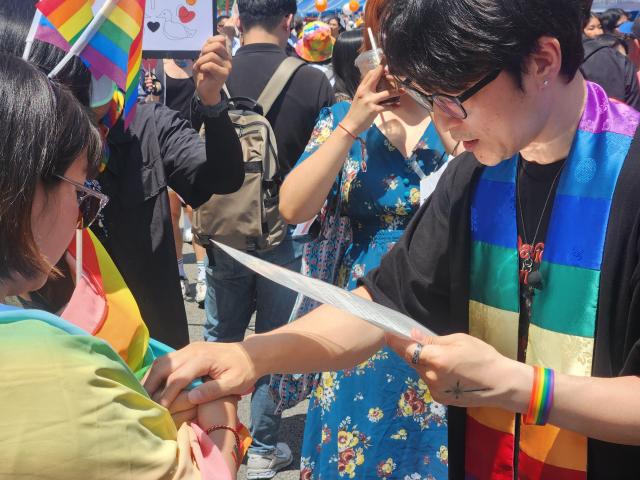
"I'm 100 percent sure that churches will change their stance in the future because the fundamental doctrine of Christianity is love. We don't have any reasons to hate the LGBTQ+ community."
A gay man in his 20s, who identified himself only by his surname Kim, explained how hard life can be for a Christian who is a gender minority. "It's tough to be at a church when you're LGBTQ+. I had been part of a typical Korean church where hate against LGBTQ exists. I don't think they 'oppose' homosexuality. They 'hate' it."
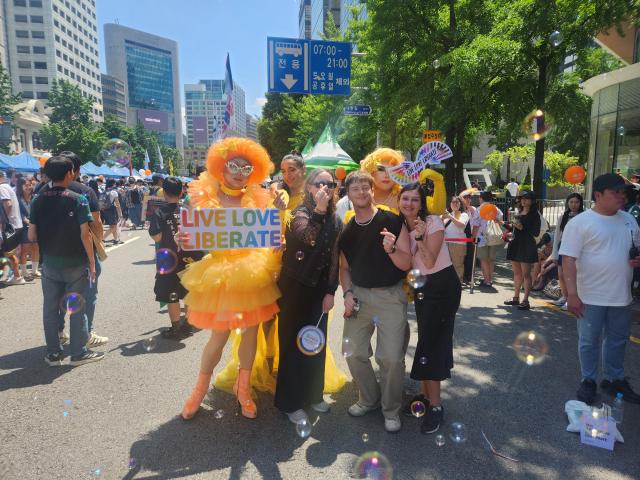
The street became increasingly crowded as participants prepared for the march at 4:00 pm, their faces full of anticipation. Laughter erupted from all corners, mixed with the thumping bass sounds from the main performance stage.
Ambassadors from countries with booths also participated. Colin Crooks, the British Ambassador to the Republic of Korea, mingled with the crowd, casually walking around the festival without staff.
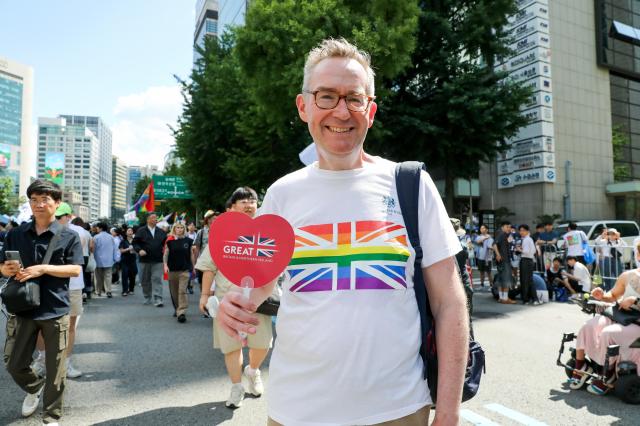
"This is something we participate in every year here in Seoul and routinely at such events around the world. It shows our solidarity with minority communities, especially the LGBT community, and our support for equal rights," he said. "We have our own booth here alongside some other embassies. For us, it's about equality, rights, and supporting the community. So, we are very proud to be part of this today."
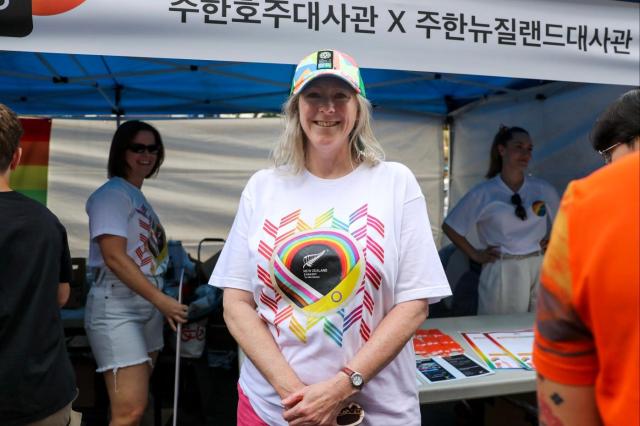
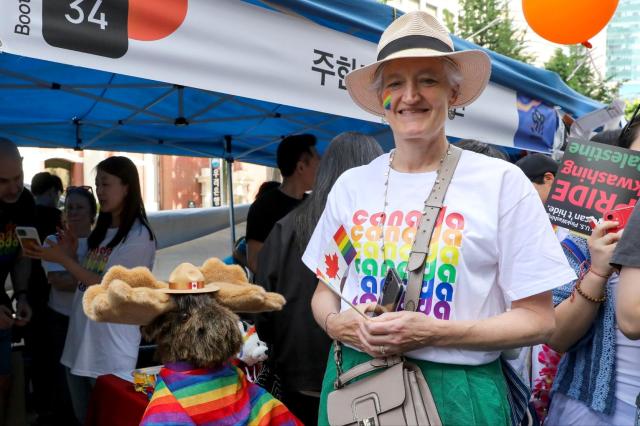
"It is really wonderful to be able to express our support for diversity and inclusion, a really important value in Canada, and it's great to be able to connect with others around the world who share those values," said Tamara Mawhinney, the Canadian Ambassador to the Republic of Korea.
During a press conference held just before the festival's climax, the car parade, Seoul Queer Festival Organizing Committee Chairperson Yang Sun-woo, also known by her nickname "Holic," told reporters that the festival is a message from the LGBTQ+ community to Korean society.
"We think that sending out a message of 'queer is everywhere' is the most important. We wish to create a society where anyone can say yes to queer without fear of discrimination," Holic said, adding that the organizing committee will continue to appeal to Seoul City that the festival must be held in Seoul Plaza because the place symbolizes the people's pride.
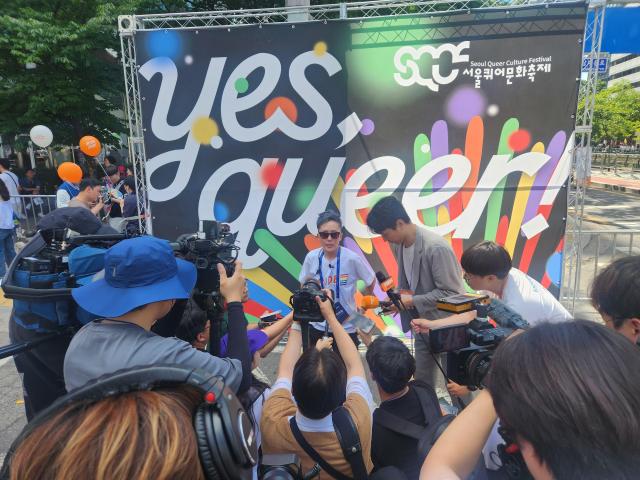
For two years, the committee asked permission to use the square, but Seoul City allowed Seoul Metropolitan Library to use the square for the period coinciding with the Seoul Queer Festival. The festival committee made multiple requests to rent Seoul Plaza but was turned down.
"We think that there are more people than we had last year. My message is, do not fear. Open the closet and take a step closer," Holic said, adding that those brave enough to participate in the festival are comforted by the enormous support from the LGBTQ+ community.
While people were enjoying the LGBTQ community festival, a crowd of some 20,000 Christians, conservatives, and other groups rallied at a palace gate next to the Seoul Plaza to protest against the popularization of homosexuality and other sexual minorities.
The protesters, organized under the name "Holy Breakwater of Unified Christian Rally," held up placards with slogans such as "We protest against homosexual queer festival" and "We oppose the comprehensive anti-discrimination law," while church ministers conducted sermons and led people in singing hymns.
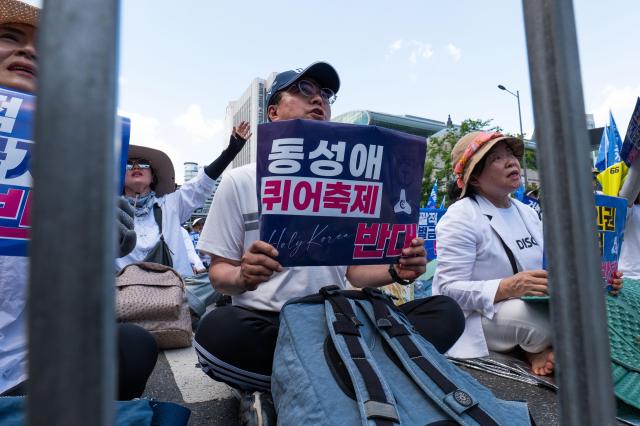
The main group of protesters were in their 30s and 40s, while about 20 percent of the Holy Korea rally participants were teenagers and young people in their 20s.
Lee Sung-Jun, who wished to be addressed as the joint secretary general of an association of Christians from 17 cities and counties in the Seoul metropolitan area, explained that Holy Korea is the country's last line of defense designed to "block homosexuality and obscene culture from spreading, like tetra pods against a tsunami."
Some conservative Christians came from other regions with their family members. Kang Sung Kook, a 48-year-old father of three young children, came with his family from the southern port city of Yeosu, about a four-hour drive from Seoul. "We came with our church members to join the protest," he said, while his wife laid down a picnic blanket for their kids.
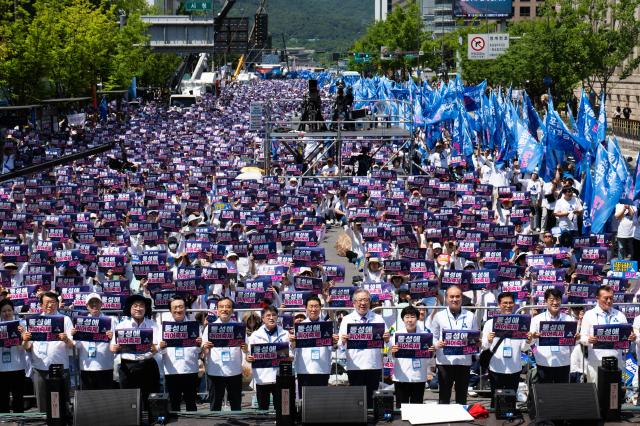
Korea has yet to enact a comprehensive anti-discrimination law that explicitly protects sexual orientation and gender identity, despite multiple legislative attempts and growing public support. Existing laws, such as the National Human Rights Commission Act, provide some protections but do not specifically cover LGBTQ+ individuals. The ongoing push for a comprehensive anti-discrimination law highlights the country's struggle to ensure equal rights and protections for all its citizens.
A 71-year-old woman from the southern Seoul district of Songpa expressed her disapproval of the anti-discrimination law. "The anti-discrimination law is outrageous and will accelerate the population decline," she said, complaining about police blocking roads to prevent a human stampede.
The Christian event also drew political support, with ruling People Power Party lawmaker Yoon Sang Hyun delivering a congratulatory message. "I give my gratitude to God above for winning this year's General Election," he said, adding, "The anti-discrimination law is a prejudice against Christians itself, and it challenges the fundamental basis of gender equality as well."
Copyright ⓒ Aju Press All rights reserved.


